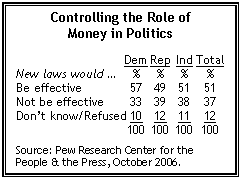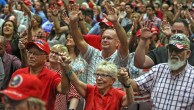by Richard C. Auxier and Alec Tyson
On Sunday morning all eight Democratic candidates for president met at Drake University in Iowa for a debate sanctioned by the Democratic National Committee. The debate was televised nationally on ABC’s “This Week” and was the third Democratic debate in less than two weeks. Candidates addressed a range of issues from the war in Iraq to which contender is the most experienced. What follows in an analysis of candidate views as compared with public opinion data.
Experience
[Illinois Sen.]
Though the experience of candidates has been a point of emphasis in the campaign and debates, rank-and-file Democrats say they are willing to overlook the characteristic. Nearly six-in-ten (59%) Democrats say that they would like to see more people from different walks of life running for high political office, while 33% disagree and say it’s more important to have people with a lot of political experience running for office, according to a November 2006 Pew survey. Republicans and independents offer similar support for candidates from different walks of life.

New Mexico Gov. Bill Richardson stated “Senator Obama does represent change. Senator Clinton has experience. Change and experience: With me you get both.” Richardson — who was a member of congress before becoming a governor — would potentially appeal to the 44% of Democrats who say that serving as a member of congress best prepares someone to be president as well as the 35% who say that serving as governor is the best preparation for the presidency. On this question Republicans take a different view, with 41% saying governors are best prepared to be president, compared with 17% who name members of congress.
Electability
While Democrats view Clinton as experienced, Stephanopoulos asked if she was electable. In reference to the negative reactions some people have toward Clinton, Stephanopoulos quoted Karl Rove: “there’s nobody who’s ever won the presidency who started out in that kind of position.” Nevertheless, a 32% plurality of Democrats say that Clinton is the most electable Democratic candidate, almost double the number who say the same about the next most highly ranked candidate, Obama (17%). Former Vice-President Al Gore and Edwards are called “most electable” by 16% of Democrats respectively.
Iraq
Iraq was a hotly debated topic with each candidate offering his or her own assessment of the war and the best way to exit the country. Sen. Joe Biden of Delaware stated: “If we leave Iraq and we leave it in chaos, there’ll be regional war. The regional war will engulf us for a generation.” Biden highlighted what is a very difficult issue for Democrats and the public. While a clear majority of Democrats (75%) favor bringing troops home from Iraq as soon as possible, nearly one-in-two (49%) say that U.S. withdrawal over the coming year would increase the chances that Iraq would fall into full scale civil war. The general public shares the desire to bring the troops home (54%) and is even more likely than Democrats to say the chances of civil war in Iraq would increase if the U.S. withdraws over the coming year (58%).

The Iraqi government received some criticism during the debate with Clinton saying: “…the political solutions seem to be out of the grasp of the Iraqis.” Former Sen. Mike Gravel of Alaska took a different tack, saying: “Who are we to tell the Iraqis — we’re trying to make them the fall guy, not our stupid mistakes.” Fully 86% of Democrats say the Iraqi government is doing only a fair (40%) or poor (46%) job running the country. This is one question about Iraq where Republicans and Democrats have almost identical views: 84% of Republicans also characterize the performance of the Iraqi government as only fair or poor.
Despite the range of opinions on Iraq, and the importance of the issue to Democratic voters — 80% call the issue very important to their vote — no clear anti-war candidate has emerged. A 56% majority of Democratic voters say that their party’s leadership has not challenged Bush’s Iraq policies enough, but these voters do not express fundamentally different candidate preferences at this stage of the campaign.
Clinton leads Obama by roughly two-to-one among both voters who want the party to stand up to Bush more firmly and voters who think the party is handling the Iraq issue about right. Similarly, none of the remaining candidates garners significantly more support among those who want to see Democratic leaders mount a greater challenge to Bush.
Pakistan
[Y]
Nuclear Weapons
Obama and Clinton’s recent spat over the use of nuclear weapons — Clinton’s campaign attacked Obama for ruling out the use of such weapons against terrorist camps while Clinton had ruled them out against Iran in a previous interview — was also brought up during the debate. Clinton said the difference had to do with answering hypothetical questions, while Obama disagreed. “It is not hypothetical that al-Qaida has established base camps in the hills between Afghanistan and Pakistan,” said Obama. “No military expert would advise that we use nuclear weapons to deal with them, but we do have to deal with that problem.” By 48% to 44%, Democrats believe the U.S. would be justified in using nuclear weapons first if another nation seriously threatened to use nuclear weapons against the U.S., according to an October 2005 Pew survey. A plurality of the general public (46%) also says the use of nuclear weapons would be justified in that scenario. A majority of Republicans (53%) agree, but independents dissent with only 39% agreeing to the use of nuclear weapons in such a scenario.

[W]
Money and Politics
The candidates again clashed over the influence of money in politics. “I don’t believe you can change this country without taking on very entrenched interests in Washington, including lobbyists, that stand between us and the change American needs,” said Edwards. He then challenged the other candidates — and more directly Clinton — to join him in not taking money from lobbyists. All candidates took turns assailing money in politics, blaming lobbyists for blocking universal health care to a lack of regulation in the financial markets. The candidates were playing to a party, and country, that is clearly dispirited with government and politics. According to a January Pew survey, dissatisfaction with government/politics is the second most important problem facing the country today according to Democrats (though well behind the war in Iraq). Overall, the country lists dissatisfaction with government/politics as the third most important issue facing the country, just slightly behind healthcare as the second.

While Clinton would not rule out accepting money from lobbyists, she also took on the issue. “I think we can do a much better job if we say we have got to move toward public financing, get the money out of American politics, because it’s the people who employ the lobbyists who are behind all the money in American politics,” said Clinton. Dodd also specifically endorsed the public financing of elections. By 57% to 33% Democrats say that new laws could be written that would be effective in reducing the role of money in politics. Republicans (39%) and independents (38%) are more likely to say that such laws would not be effective.
Democratic Congress
[Those serving in Congress]
